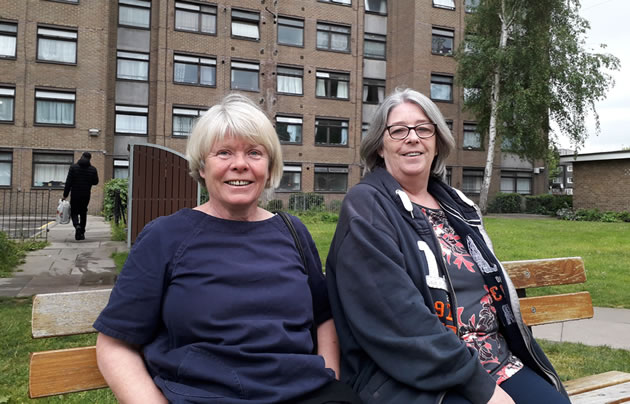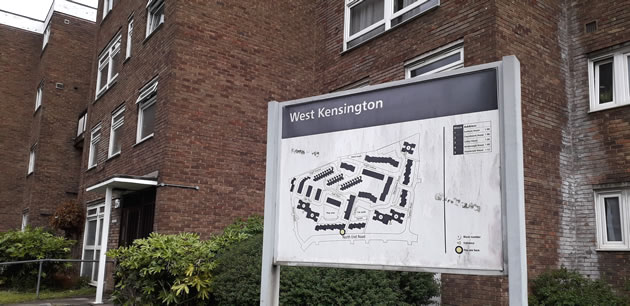'Ten Years of Hell' on Demolition Threatened Estates
Residents of West Kensington and Gibbs Green estates living with uncertainty

Sally Taylor (Left) and Diana Belshaw (Right) on the West Ken Gibbs Green estate. Photo by Owen Sheppard
Imagine waking up every morning knowing this might be the day a demolition notice is served on your home, and every building in your community.
Then imagine you have endured that reality for more than a decade..
For 750 households on the West Kensington and Gibbs Green estates, earmarked in 2009 as part of a £12 billion 8,000-home regeneration scheme, the situation has been “complete hell”. Total uncertainty hangs over the two West London estates that form part of what Hammersmith and Fulham Council once marketed as the ‘Earl’s Court Opportunity Area’, encompassing the now demolished concert and exhibition hall of the same name.
Two long-standing, house-proud residents, Diana Belshaw and Sally Taylor, have been trying to help their community ever since their ongoing “nightmare” began.
“Ten years… it’s so long that little children will now be teenagers,” said Ms Taylor, 57.
“It’s been horrible, you’re made to feel that you don’t matter. It’s your home and they’re trying to take it away from you.”
She adds: “We’ve got no options, we’re trapped. It doesn’t matter if you’re a tenant or a leaseholder. People can’t sell because estate agents won’t touch these properties. So we’re all stuck.
“We don’t honestly know what’s going to happen. Every day I wake up and I don’t know if the bulldozers will be coming. At times it’s been hell.”
The two women, both Charing Cross Hospital nurses, used to separately chair residents associations on the two estates. But they “joined forces” to mobilise the 2,000 residents and keep them informed of the oncoming demolition.
Sold by the then Tory-run council in 2012 for £105 million, the estates lie in the hands of property developer Capital and Countries (Capco), also a major real estate holder in Covent Garden.
But the firm has been trying to sell the vast Earl’s Court plot since 2017. After its value fell by £450 million from 2016 – according to reports by Property Week – Capco held talks with a Hong Kong-based billionaire, and there were rumours the company was approached by Saudi property group, Olayan, though Capco would not confirm this.
Capco has always said it would re-house all social tenants and resident leaseholders. But there is an ongoing dispute over whether its plans fulfil the promise of giving residents new homes that are like-for-like.
Meanwhile, the two nurses defiantly assert that the estates, with nearly two-thirds social housing, are a nice place to live.
“It’s a diverse community,” said Ms Belshaw, also 57. “There’s retired people, professionals, people from Asia, people from Somalia. There’s lawyers and solicitors living on the estates.”
It’s not just the anxiety of not knowing where they will end up living. The pair say residents were shown “disrespect” during attempts to paint a poverty-ridden picture of the community, in order to justify its regeneration.

Picture: Owen Sheppard
Ms Belshaw claims: “We saw papers where people from the council have said the estates had ‘pockets of deprivation’ and that people had ‘low intelligence’. And they said it had high rates of teenage pregnancies… We have been shown total disrespect.”
Ms Taylor continued: “They went around the estates looking for bad things to take photos of, like overflowing bins.
“They tried to say to developers ‘oh look how these people will be better off if you regenerate the area’.”
Ms Belshaw added: “Even though it was their responsibility to fix these things and look after the place.”
Now attempting to break the gridlock is Hammersmith and Fulham Council’s Labour leadership whch took over in 2014.
Their plan, spearheaded by council leader Stephen Cowan, is to use compulsory purchase powers to forcibly buy the land back from Capco to the tune of £200 million. It follows reports that negotiations for a resale back to the council ended with acrimony in 2018.
“This is the most important development site in London,” Mr Cowan said last week. “But no progress has been made in almost seven years — no schools, no homes, no open space, no improved transport and no jobs for local people.
“We need to bring forward comprehensive redevelopment of the area. We will do proper master-planning, make sure all the sites work together and ensure we maximise genuinely affordable housing.”
Unusually, the compulsory purchase order (CPO) would involve buying sections of land to the east of the estates also owned by Transport for London and Tory-led Kensington and Chelsea Council. Mr Cowan wants these sections to be used for building new homes, while leaving the West Ken and Gibbs Green areas alone.
However the council will need the government’s permission before making the forced buy-out, and will have to form a compelling legal case. A spokesperson for Capco said they believe the council “has not demonstrated a case” for a CPO.
Gary Yardley, spokesman for Earls Court Partnership Limited which is the name Capco has for the project, said: “The council has not demonstrated that they have a credible position in relation to CPO, a process which is only likely to slow down the Earls Court scheme and delay the range of public benefits that could arise from the Opportunity Area.
“We understand the frustrations of the residents and Capco will continue to engage with stakeholders in relation to future plans for the West Kensington and Gibbs Green estates. In the meantime, the Conditional Land Sale Agreement, a contract that the London Borough of Hammersmith and Fulham entered into freely, remains in place.”
Back on the estate, Ms Taylor says people “are more anti it [the demolition] than ever”, with “hardly anyone” now in favour.
There is also an ongoing campaign by residents calling for an “asset transfer” of the estates to a not-for-profit organisation they propose to set up. If given the estate, the residents say they would implement their “People’s Plan”, vow to refurbish the blocks and build 250 new homes.
“But,” Ms Taylor said, “The whole thing does get you down. It’s just tiring.
“When you look back on 10 years, you think now it might never happen. But someone might just come and buy it tomorrow. You just don’t know.”
Owen Sheppard - Local Democracy Reporter
May 22, 2019